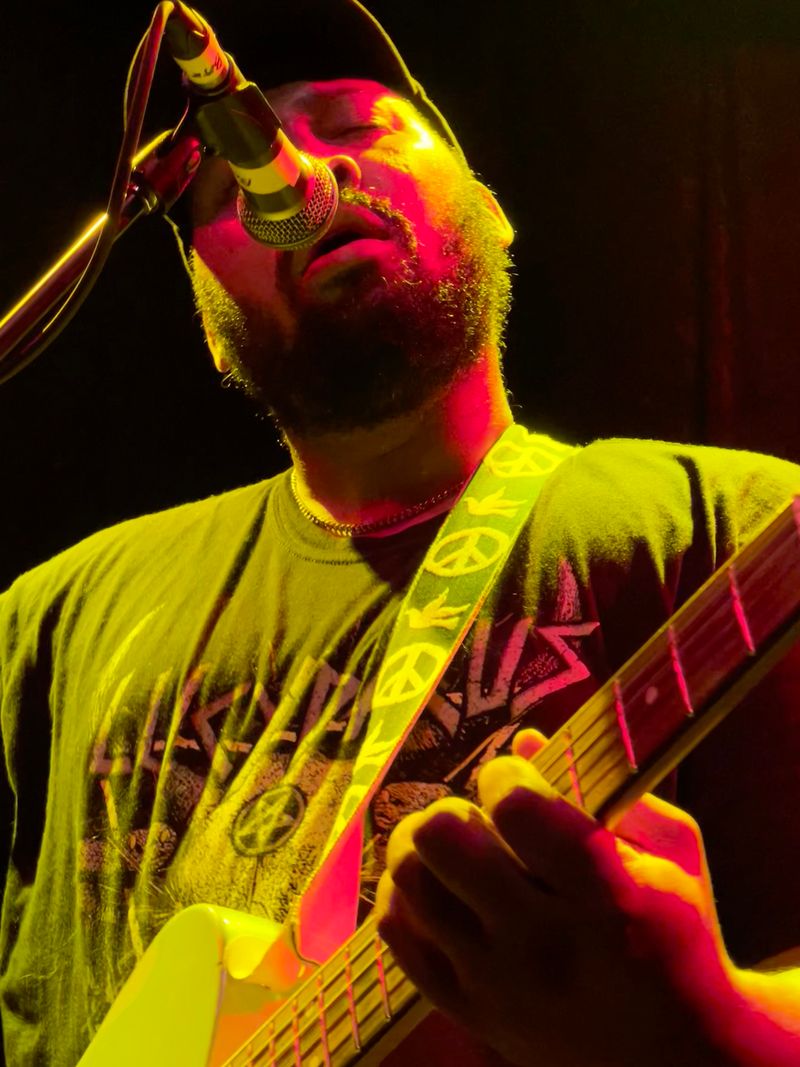I appreciate surprises in music more than anywhere else. Some of my favorite surprises are:
- An artist who reveals their depth by deftly navigating diverse styles, sometimes entire genres, across different songs or albums
- Songs that suddenly change tempo and instantly transform their mood or feel, sometimes only briefly, in a way that makes them richer
- A cover of a song in which the new version is the artist's own while paying tribute to the original
The common theme that I appreciate is an element of surprise that reveals versatility and depth.
Bartees Strange, the stage name used by Bartees Leon Cox, Jr., is an emerging artist whose small but growing repertoire has surprised me more than any other in recent memory. Through a handful of singles and an EP followed by last year's full-length album, Bartees has released songs, in a multitude of styles, a large number of which encompass some form of change-up. In a unique turn, his EP delivered a set of seven excellent, personal covers of songs by The National.
Change-ups
His recent single, Boomer, caught, then demanded my attention. I first heard it on satellite radio and was enjoying the groove while not directly paying attention to it. When the song changed, I was as surprised as I was pleased. Before long it changed again and Bartees had my complete attention. My enjoyment of the song only continued to grow with repeated listening.
Boomer
Boomer contains multiple rhythms and lyrical styles: It's part indie rock, arena rock, R&B, and includes a nod to Rap. I estimate at least four major style, genre, or rhythm changes in just over three minutes. The changes are quick, each only lasting slightly more or less than 20 seconds. I counted seven distinct changes employing an A-B-C pattern twice, a single D section, then finishing with C.
Don't sweat the analysis. The song makes it all easy to follow.
I quickly became obsessed with Boomer and needed to know more so I sought out the rest of Bartees Strange's music. As I dug into his catalog, I learned that his mixing of styles, tempos, and genres has been part of his music from the beginning. Beyond the purely musical evidence, Bartees declared as much. In a March interview by Amit Sharma in Guitar World magazine, Bartees said exactly that:
I’m very into showing [that] things from different genres work really well within each other…Even if the infectious brilliance of Boomer isn't to your liking, I recommend sampling Bartees' full catalog. There is a lot to try and much more variety in such a modest catalog than one might expect. (See A curated introduction below.)
Far
The song Far is another excellent example of how powerful change-ups can be. It begins as a pretty acoustic ballad. An incredibly subtle personal highlight for me is when Bartees' raises his vocal pitch singing, beautifully, the second clause in:
If I could walk on water, I would be at your place
Just prior to the midpoint, the melody changes to a fast-strum rhythm. Shortly after the lyrics resume, however, the quick strummed rhythm is punctuated by three rapid drumbeats. These repeating three-note sequences, coupled with the rhythmic strumming, build anticipation for the third and final major change, which occurs just under a minute later: The drums return with a full-on driving beat that carries us into the half-screamed vocals that ultimately climax, then shrink, replaced by the original acoustic guitar, and Bartees' soft voice, to the finish.
Far appears as the ninth song on Bartees Strange's full-length debut or, in a slightly abbreviated alternate version, as a Bandcamp-only exclusive final song on the digital download of the Say Goodbye to Pretty Boy EP.
Going Going
Going Going is another example, though less dramatic. It's a slow and dark, almost brooding song. The pace remains relatively steady until the final minute when it ramps up to a frenetic finish with climactic rock vocals. Bartees is clearly having fun — and he’s taking me with him wherever he goes.
The Beginning
After releasing an original single in 2019, Bartees Strange released several covers of songs by The National as singles in 2020, a few of which included original B-sides. His first EP, Say Goodbye to Pretty Boy, is all covers of songs by The National.
Why would a new artist release a debut EP containing only covers of songs by another artist? To make a point of course! The answer is revealed in the Bartees interview Bartees Strange presents his heartfelt homage to The National, In Studio by John Schaefer (New York Public Radio via newsounds.org):
... he focused his attention on reinterpreting and translating their [The National's] songs through a personal lens, acknowledging the possibilities and contradictions within the genre.
This makes perfect sense based on what I've heard in his songs and observed while watching him perform live.
Because Bartees is a huge fan of The National, he is intimately familiar with their catalog and, like any true fan, connects with some of their songs deeply. Covering them allowed him to:
- Share his love for The National's music by performing some of his favorites
- Reinterpret their songs in his style while pushing the boundaries of genre; to make them fresh in a new way
- Experience each song more deeply through the process of developing his interpretation, then actually performing it
The National Covers
I've liked many songs by The National over the years (mostly heard on satellite radio) but have never listened to their music directly. I enjoy Matt Berninger's voice and can easily recognize songs by The National. Although I didn't know the names of the cover songs, I immediately recognized the refrain from Mr. November when I heard it and knew it was a cover, though I had to look up the original artist.
I am extremely impressed by how Bartees transformed these songs to be his own: sometimes by changing the pace, sometimes the rhythm, other times the lyrical phrasing.
Lemonworld (The National cover)
What immediately grabbed me about Bartees' interpretation of The National's Lemonwold was the juxtaposition of his ever-so-soft (particularly the second set of do-do-dos):
Losin' my breath, do-do-do-do-do-do-do-do-do-do
Losin' my breath, do-do-do-do-do-do-do-do-do-do
Immediately followed by the powerful:
You and your sister live in a Lemonworld
I want to sit in and die
You and your sister live in a Lemonworld
Do-do-do-do-do-do-do-do-do-do
In the original version by The National, this latter stanza maintains the same cadence as the preceding one. Bartees' alternation of calm and emphatic changes the entire feel of the song, drawing in those who enjoy the juxtaposition. He mutes the do-do-dos in one stanza, then emphasizes them in the next. It's a delicious change-up.
About Today, Mr. November, and The Geese of Beverly Road (The National covers)
Similarly, Bartees' versions of Today, Mr. November, and The Geese of Beverly Road provide alternate views. For these songs, Bartees slows the pace, largely by replacing frenetic drum beats with quieter rhythms, maintaining the more somber mood for the duration of each song.
For example, Bartees' rendering of the Mr. November lyrics:
I'm the new blue blood, I'm the great white hope
I'm the new blue blood
Have a completely different mood due to Bartees almost whispering the final line.
Looking for Astronauts
Beginning with a distorted voice, Bartees transforms Looking for Astronauts dramatically by infusing it with a throbbing dance beat, a clear example of genre-bending exploration.
Undoubtedly due, at least in part, to the fact that some of the covers are the first version of the songs I heard and grew to like, and with no offense to The National, I prefer the Bartees Strange versions of each cover precisely for their pace changes and the lyrical clarity that Bartees adds.
The Originals
Curious about the original versions by The National? You can listen to them here.
Final Thoughts
In addition to the songs already mentioned, Live Forever contains other notable songs, several with more genre-mixing fun:
- Fallen For You, a beautiful ballad
- Mustang, an indie celebration that flirts with arena rock at the climax
- Weights, which essentially is arena rock
- Stone Meadows, which combines Indie Rock with R&B
- Ghostly, which is R&B driven
I was lucky enough to attend a Bartees Strange show at Rickshaw Stop in San Francisco earlier this month. It was a perfect show because Bartees was the main act and it is a very small club, which meant I could position myself right up front. This post's picture was captured at the show. Bartees and his band put on an incredible show and I learned several things observing their performance:
- Above all else, Bartees is a huge music fan and he loves music of all genres, types, and styles.
- His mixing of styles within a song is driven by his love for all of them. I could feel his deep appreciation for each type included in his music as he performed.
- Bartees truly feels the music and loves to perform it, to be able to express each song's emotions with his voice and use his whole body.
Bartees Strange's debut EP established him as an artist who not only has the ability to fully reinterpret others' songs but lacks any reservations about doing so. He is a fearless, unapologetic fan – with tremendous talent.
Live Forever, his first full-length album of original material, announces Bartees Strange's arrival with incontrovertible evidence of his songwriting talent across multiple, often intertwined genres. He is an artist with great depth with an ability to deftly express himself in multiple styles. He is indeed an artist to watch.
More Bartees Strange
To learn more about Bartees and dig into his full catalog, the links below provide easy access.
A curated introduction
The following playlist provides a quick tour of Bartees' talent covering catchy, fun, and diverse songs.
The rest of the music
The links below provide quick access to the complete Bartees Strange catalog.
About
Visit Bartees Strange's website or Bandcamp site.

